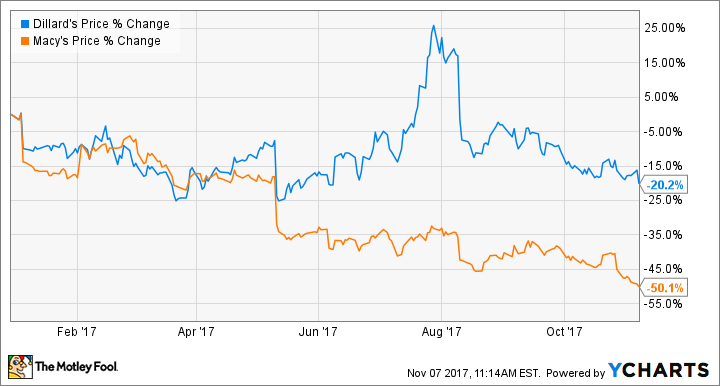Department store operators Macy's (M 1.53%) and Dillard's (DDS -2.48%) are set to release their third-quarter earnings reports in the next few days. Both companies posted disappointing performances during the first half of 2017. As a result, shares of Dillard's are down 20% year to date, while Macy's stock has lost half of its value since the beginning of the year.
Macy's and Dillards Year-to-Date Stock Performance, data by YCharts.
Last quarter probably wasn't much better for department stores. During the quarter, Hurricane Harvey and Hurricane Irma struck Houston and Florida, respectively. That probably put a damper on sales, making it nearly impossible for Macy's and Dillard's to get revenue growing again.
Instead, Macy's investors should focus their attention on the company's real estate monetization efforts, which are continuing to gain steam. Meanwhile, the key question for Dillard's investors is simply whether the company was able to earn a profit during the third quarter.
Macy's: It's all about real estate
Macy's has been coping with comp sales declines since the beginning of 2015, and it's finally starting to address the problem in a meaningful way. However, Macy's new initiatives probably didn't have much impact during the third quarter.
For example, Macy's relaunched its loyalty program last month with a new structure designed to provide the biggest rewards to the biggest spenders. It has also retooled its marketing strategy this fall. The bulk of the improvement from these changes will come in the fourth quarter and thereafter. Initiatives like rolling out an optimized Macy's Backstage off-price concept to more stores will take even longer to accomplish.
By contrast, real estate monetization is a key long-term project that is already bearing fruit. Last quarter, Macy's sold part of its downtown Seattle store for $50 million. It also signed a tentative agreement to sell 700,000 square feet of space in its Chicago flagship. In conjunction with the earnings report, management may disclose the proposed sale price and closing date for this deal.

Macy's is making progress on monetizing its real estate. Image source: Macy's.
Meanwhile, Macy's real estate alliance with Brookfield Asset Management (BN -1.52%), first announced last November, could finally start to deliver some results. On Macy's earnings call in August, CFO Karen Hoguet said that Brookfield would likely recommend proceeding with plans for additional development on about two-thirds of the 50 sites it is studying.
Brookfield Asset Management has until the end of 2018 to do its "pre-development" work. But it will probably come up with plans for certain sites faster than that. As Macy's starts to publicize its development plans for some properties, investors will get a better sense of the size of its real estate opportunity. Right now, Macy's seems drastically undervalued, considering the extent of its real estate assets.
Dillard's needs to get back in the black
Dillard's has more immediate problems than Macy's. The company unexpectedly posted a big loss in the second quarter of 2017, due to heavy markdown activity.
At the end of Q2, inventory was still up 2% year over year at Dillard's, whereas retailers are trying to reduce their inventory due to the weak sales environment. Furthermore, the hurricanes that hit Texas and Florida could have disrupted Dillard's efforts to clear out excess inventory during the fall. (The company has its highest concentration of stores in those two states.)
As a result, markdowns probably weighed on Dillard's profitability again in the third quarter. That said, Q3 tends to be more profitable than Q2 for Dillard's, driven by the back-to-school shopping period. During 2016, Dillard's posted earnings per share of $0.67 in the third quarter, compared to earnings per share (EPS) of just $0.35 in the second quarter.
As a result, none of the analysts who follow Dillard's expect the company to report another loss for the third quarter. On the other hand, the average analyst estimate for Dillard's full-year EPS has plunged by 25% in the past three months. That's a trend that needs to stop.
Thus, the key for investors is whether Dillard's was able to stabilize its profitability last quarter. It's OK if the company reports another sales decline because it walked away from unprofitable sales. By contrast, if Dillard's reports another sharp contraction in its profit margin, there could be more pain ahead for shareholders.






